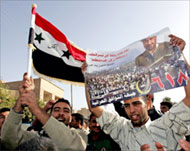Bush: Don’t give up on Iraq
President Bush has made an unusually direct personal appeal to Americans not to give in to despair over Iraq, claiming that “we are winning”, despite a tougher-than-expected war.

Confronting American doubts about the war, Bush said in an Oval Office address on Sunday night that he realised the US toll in Iraq had led some to ask whether “we are creating more problems than we are solving”.
“I do not expect you to support everything I do,” he said. “But tonight I have a request: Do not give in to despair, and do not give up on this fight for freedom.”
Bush, struggling with low approval ratings and wide public discontent with the rising US toll, hopes that Iraq’s election last Thursday will mark a turning point in support for his strategy, which is costing taxpayers $6 billion a month.
His rare Oval Office address was his fifth speech devoted to Iraq since 30 November, part of a White House offensive to confront criticism of the war directly and try to keep Democrat calls for a phased troop pullout from gaining widespread public support.
|
“Not only can we win the war in Iraq – we are winning the war in Iraq” |
In his remarks, he criticised the “defeatism” of some of his political rivals, saying steady gains are being made.
“My fellow citizens: Not only can we win the war in Iraq – we are winning the war in Iraq,” he said.
In recent speeches, Bush has changed his tone from outright sunny optimism to a more realistic assessment of Iraq, admitting that mistakes were made in the run-up to the war and that the road ahead is long.
More sacrifice
 |
|
Bush’s speech follows Iraq’s |
Along those lines, Bush acknowledged that the United States got off to a slow start in reconstruction efforts and in training Iraqi security forces.
“This work has been especially difficult in Iraq – more difficult than we expected,” Bush said.
He predicted “more testing and sacrifice before us”, but said grim scenes of carnage on television prove only that the war is difficult.
“It does not mean that we are losing,” he said.
Earlier, Dick Cheney, the vice-president, had a more typically upbeat message during a surprise visit to Iraq, saying in an interview for ABC News he believed that Iraqis overwhelmingly think they are better off today than when Saddam Hussein ruled.
‘Liberators’
“I think the vast majority of them think of us as liberators,” said Cheney, pointing to polls showing many Iraqis optimistic about their future.
Bush gave no ground to critics such as John Murtha, the Pennsylvania Democratic representative, who call for a quick pull-out of US troops.
He stuck to his position that US troop reductions depend on progress in training Iraqi forces and on the democratic process.
“As these achievements come, it should require fewer American troops to accomplish our mission,” he said.
Decisions on troop levels, he said, will depend on progress on the ground and advice from his commanders, “not based on artificial timetables set by politicians in Washington”.
The US commander in Iraq said American forces there were likely to decrease from 150,000 to their pre-election total of 138,000 by early February.